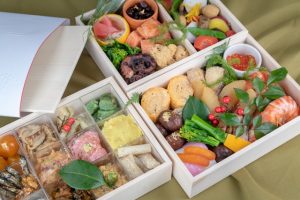 Lockdown Has Boosted The Business Of The Meal Box Trend
Lockdown Has Boosted The Business Of The Meal Box TrendThe culture we live in has quickly moved to a culture of convenience, getting meals delivered pre cooked or ready to cook.
In the 1950’s & 60’s we saw people shift from eating at home to eating out.
In the 1970’s & 80’s we saw the rise of take away food and fast food becoming the new convenience.
In the 1990’s & 2000’s we saw supermarkets offering dine in offers and ready meals that either need 40 mins in the oven or heated in the microwave. This made it easier for us to create meals rather than buying protein, veg, seasonings & ingredients and following a recipe.
Over the past few years we have seen meal delivery companies like Deliveroo streamline the food delivery culture. Ready to cook meal companies like Simply Fresh have also seen their customer base grow particularly with lockdown.
Where are things going next, as we get both fast food and restaurant quality delivered to our dining tables (or TV dinner trays).
Sometimes spending time hunting round the supermarkets for particular ingredients can be frustrating, especially with a face mask. Getting a particular ingredient for a particular meal might mean buying excess.
Meal delivery companies claim to portion meal ingredients, meaning a balanced meal, portion controlled with minimal food waste.
Is this convenience or laziness? Food companies have had to re-market themselves to meet the demands of the new normal.
The definition of ‘organic farming’ is food that is produced using environmentally and animal friendly farming methods.
Organic food has been around for centuries, it is only recently that farmers have started using pesticides and chemicals to increase yields, kill pests and growing food outside of seasons.
Organic food is popular with vegans and vegetarians (as well as all the other recent genre’s) to reduce the damage we do to our planet.
One big focus for restaurants during the lockdowns of 2020, when indoor dining was prevented, is food delivery.
Starters, mains and deserts were delivered to local residents to try and keep some income coming through.
Some restaurants really took events like valentines day on board to bring the restaurant to the diners at home.
This also boosted business for the popular food delivery companies like Just Eat.
Even Michelin stared restaurants like Heston Blumenthal jumped on board by offering ‘Dinner at home’.
Many restaurants have adapted their marketing to embrace the food delivery experience.
Here are 7 local restaurant marketing tips that may be helpful.
Food delivery companies are booming in the post lockdown world, since habits have changed and the process of ordering could not be easier.
Many restaurants are still offering the ‘dine in’ experience in addition to their traditional service since we have entered into a food revolution.
Where did that come from, vegan is the new buzz word, with many restaurants offering vegan options, and some catering exclusively for this new market.
Even the top end michelin restaurants are tapping into this new market of non meat and non dairy options.
There is even a ‘where is the local vegan restaurant’ website called Happy Cow that directs you to the local vegan eatery.
We have all seen the cars queuing outside McDonalds and KFC, the convenience of fast food is still there as a quick tasty affordable option to keep the children (inside us also) happy.
Delivery firms like Deliveroo also will deliver fast food right to your home, convenience just got easier.
Ever since the 1980’s the boom in fast food has grown right across the UK despite the health warnings and dangers of obesity.
Looking back over the past 30 years, we went from fast food, to delivered food cooked or non cooked. Where are we going as a society?
Obesity is a growing issue, even though there is a boom in vegan, vegetarian and the latest diet like the carnivore diet.
True that lockdown has changed the way that we eat as a society, but what does the new normal have in store going forward is anyones guess.
These day’s there is a choice for everyone, whether you can cook or not. Whether you are a busy commuter that has no time for home cooking, or a student on a budget.
The convenience of ordering food packages from organically and sustainable companies can be done over the internet.
The convenience of popping down the road to the local take away (as long as you live in a town or city).
The convenience of going to the supermarket, where everything you could eat is available in every season 7 days a week. In the old days you had to go to the butchers, the greengrocers, the fish mongers, the bakers for individual seasonal food. Closed on Sundays and half day Wednesdays things have got easier.